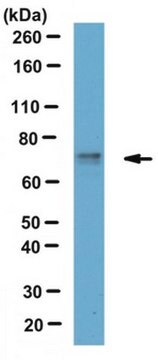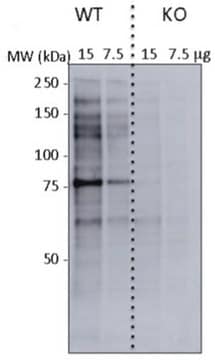IRMM531B
Titanium
IRMM®, certified reference material, 0.5 mm foil
Sign Into View Organizational & Contract Pricing
All Photos(1)
About This Item
Empirical Formula (Hill Notation):
Ti
CAS Number:
Molecular Weight:
47.87
MDL number:
UNSPSC Code:
41116107
PubChem Substance ID:
NACRES:
NA.24
Recommended Products
grade
certified reference material
Agency
IRMM®
autoignition temp.
860 °F
manufacturer/tradename
JRC
resistivity
42.0 μΩ-cm, 20°C
bp
3287 °C (lit.)
mp
1660 °C (lit.)
density
4.5 g/mL at 25 °C (lit.)
format
matrix material
SMILES string
[Ti]
InChI
1S/Ti
InChI key
RTAQQCXQSZGOHL-UHFFFAOYSA-N
Analysis Note
For more information please see:
IRMM531B
IRMM531B
Legal Information
IRMM is a registered trademark of European Commission
Storage Class Code
11 - Combustible Solids
WGK
nwg
Flash Point(F)
Not applicable
Flash Point(C)
Not applicable
Choose from one of the most recent versions:
Certificates of Analysis (COA)
Lot/Batch Number
Sorry, we don't have COAs for this product available online at this time.
If you need assistance, please contact Customer Support.
Already Own This Product?
Find documentation for the products that you have recently purchased in the Document Library.
Jinho Shin et al.
Journal of nanoscience and nanotechnology, 13(8), 5807-5810 (2013-07-26)
In this study, hydroxyapatite (HA) was coated on anodized titanium (Ti) surfaces through radio frequency magnetron sputtering in order to improve biological response of the titanium surface. All the samples were blasted with resorbable blasting media (RBM). RBM-blasted Ti surface
Hai Liu et al.
Journal of nanoscience and nanotechnology, 13(7), 5119-5125 (2013-08-02)
In this paper, pure and Eu3+ doped TiO2 nanocrystals (NCs) have been fabricated successfully by a two steps of sol-gel and hydrothermal methods. The microstructures, morphologies and photoluminescent properties of Eu(3+)-TiO2 were investigated by X-ray diffraction (XRD), field emission scanning
Huajun Feng et al.
Journal of nanoscience and nanotechnology, 13(7), 4981-4989 (2013-08-02)
Phosphorus-doped (P-doped) TiO2 catalysts with a stable anatase-brookite biphase structure were successfully synthesized by integrating ultrasonication with phosphorus doping and Pluronic P123 surfactant. The synthesized catalysts were characterized using X-ray diffraction, transmission electron microscopy, nitrogen adsorption-desorption, Fourier transform infrared, and
A Kurbad et al.
International journal of computerized dentistry, 16(2), 125-141 (2013-08-13)
This article presents two novel options for lithium-disilicate restorations supported by single-tooth implants. By using a Ti-Base connector, hybrid abutments and hybrid abutment crowns can be fabricated for different implant systems. The latter option in particular is an interesting new
Michele Iafiscol et al.
Journal of nanoscience and nanotechnology, 13(7), 4720-4726 (2013-08-02)
Titanium and its alloys are the current materials to manufacture oral implants because of their excellent mechanical properties and biocompatibility. However the increasing needs of the patients to receive fast and reliable rehabilitation have forced materials scientists to modified the
Our team of scientists has experience in all areas of research including Life Science, Material Science, Chemical Synthesis, Chromatography, Analytical and many others.
Contact Technical Service



